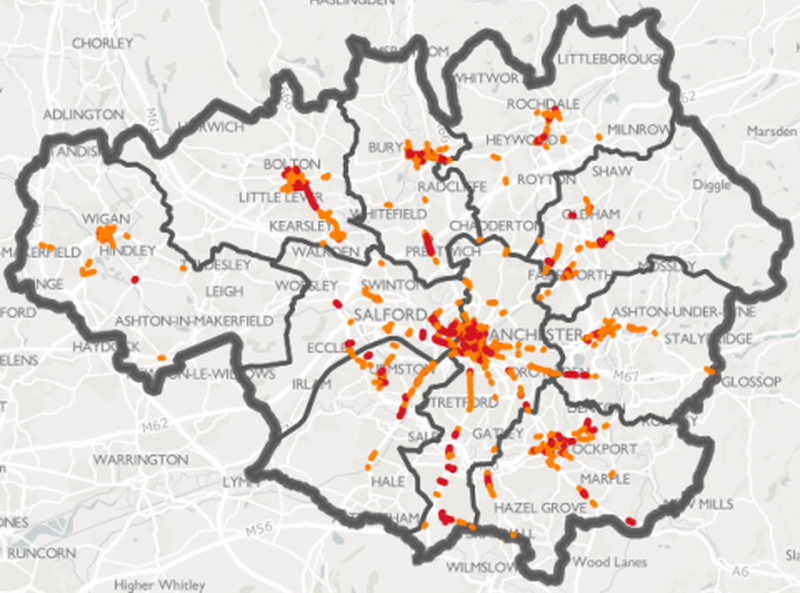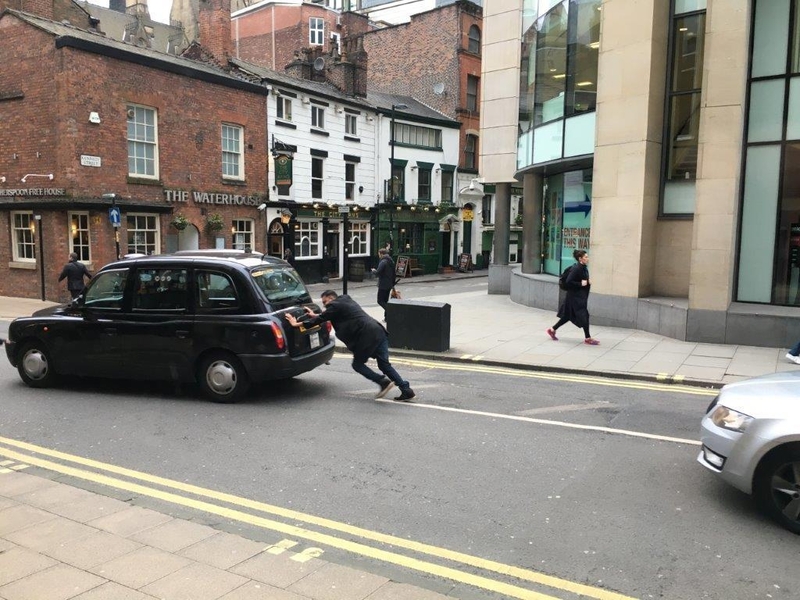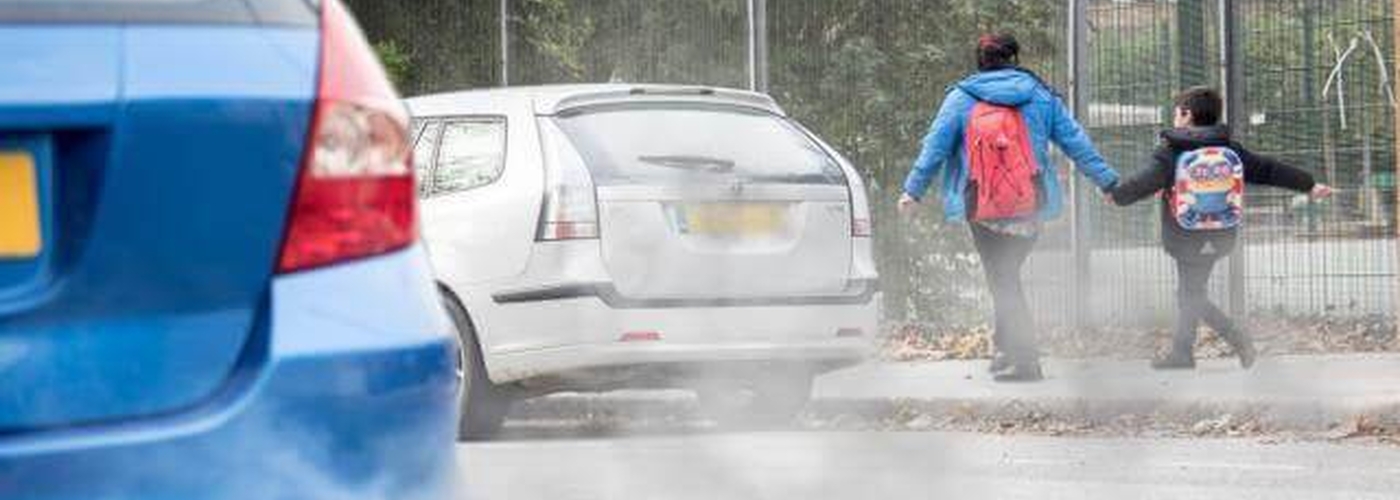The Clean Air Zone Financial Support Scheme goes live at the end of November
Last week, we brought you up to date on the Greater Manchester Clean Air Zone (CAZ), which had been until recently as clear as the air above a tailback on the A56.
That article went into detail about who would have to pay and how the CAZ fits into Manchester's current political landscape. With Andy Burnham making strides on his plan to radically overhaul Greater Manchester's public transport, GM could genuinely be a nicer place to travel.
Children are especially vulnerable to the effects of air pollution
Work is also continuing to prepare for the launch of the Zone, with more than 160 automatic number plate recognition (ANPR) enforcement cameras installed to date. The first was installed on Vernon Street in Bolton, with 850 to be in place to enforce any non-payment of daily charges when the Zone is in operation. Clean Air Zone signage is also being introduced on the highways network across the city region and in neighbouring local authority areas.
The CAZ comes with costs and drawbacks though. To find out how people will be affected by the introduction of the CAZ, we spoke to GM residents to explore who the Clean Air Zone will benefit and what may be some unforeseen consequences.
Why are we having a Clean Air Zone at all?
As detailed in the previous article, the Government has instructed Greater Manchester to clean up its air. This is a legal requirement but there are clear health benefits for all and knock-on benefits economically.
According to CBI Economics, in Greater Manchester, 15% of all deaths and 8% of hospital admissions in 2019 were due to respiratory conditions. A further 24% of deaths in 2019 were due to circulatory and heart conditions, and 7% were due to malignant cancers, all of which are to an extent attributable to air pollution.
Manchester-based GP Dr Sinead Millwood recently published a video in which she measures pollution levels as she cycles to work. She said: “Air pollution is a big problem here in Manchester. Every year, 1200 deaths are contributed to by air pollution. That’s 24 a week here in Manchester. About 80 per cent of this is thought to be related to traffic fumes.”
Perhaps the most concerning part of the video is where Dr Millwood stops outside a primary school and finds that pollution levels are “very high”. At their highest, they are three times the amount that is rated very high/dangerous. Children are especially vulnerable to the effects of air pollution because they actually breathe a lot more air than adults – around four times the amount relative to body weight. Exposure to air pollution can suppress lung function growth in children. Low birth weight, childhood asthma, pneumonia and Sudden Infant Death Syndrome are all associated with air pollution.
Yesterday on Oxford Road, NO₂ levels exceeded the short-term air quality guidelines
— Clean Air Oxford Road (@CleanAirOxfRoad) November 24, 2021
Yesterday on Oxford Road, NO₂ levels exceeded the short-term air quality guidelines
— Clean Air Oxford Road (@CleanAirOxfRoad) November 23, 2021
Yesterday on Oxford Road, NO₂ levels exceeded the short-term air quality guidelines
— Clean Air Oxford Road (@CleanAirOxfRoad) November 22, 2021
Matt, a city centre resident and asthma sufferer told me that his asthma is much worse when he is at home: “It’s definitely noticeable. If I go to the countryside, I won’t need my inhaler. Come into the city and I need it every day.” He tells me that asthma inhalers are one of the NHS’s biggest expenses when it comes to medication. Last year alone, the costs of air pollution to the NHS and social care in England were estimated to be £157 million. The latest findings from Public Health England warn these costs could reach as much as £18.6 billion by 2035.
A parent of a child suffering from serious asthma told Confidentials "The clean air zone has been long overdue and is the only way we can make a significant change in cutting toxic roadside nitrogen dioxide pollution.
Like many we can't afford to upgrade our homes to be airtight with integrated MVHR systems. Instead, we have air purifiers in the main rooms of the house, not only to tackle the dust from within, but also to tackle the polluted air that gets into the house.
When you read about the death of Ella Adoo-Kissi-Debrah, it is clear that more needs to be done, and this is a step in the right direction. Although the government will need to do more to assist those whose businesses will be affected by the introduction of the clean air zone. As much as we need the clean air zone to be introduced, measures need to be put in place to financially assist those who needs to upgrade their vehicle to help combat this issue of providing clean air for all."
So the broad justification for a CAZ is clear – a healthier population and a huge saving in health spending. As health spending is devolved, all savings directly benefit the residents of Greater Manchester. So even if you personally don’t suffer from a lung condition you will benefit from the freeing up of funds to be spent on other issues.
A taxi driver on how CAZ will affect his business
As touched upon in our earlier story, the downside to the CAZ will mostly be felt by small businesses. Mike Brown (“Everyone knows me as Taxi Mike”) owns a seven-vehicle fleet of adapted taxis that take disabled customers “everywhere”.
“We take people anywhere and everywhere. We take customers to the doctors, the dentists, to clinics they need to go to. But we also take them to hairdressers, funerals, weddings and just days out. Sometimes we even just take them out for a drive, just to get them out of the situation they are in. It serves the customer but also as a respite for carers,” Mike told Confidentials.
Mike’s fleet is specially adapted to fit the needs of his customers. Black cabs don’t cut it, he assures me, because they just aren’t big enough to fit many types of wheelchairs. Besides, the drivers understandably don’t have the training needed to deal with the sometimes complex situations that arise.
“We aren’t just taxi drivers. The customers we take might have seizures or bathroom accidents. It needs care and humanity to do the job.
“Now if the Clean Air charge is £7.50 a day for each of our vehicles, and there are seven vehicles, that’s well over £350 per week. Impossible!
“Home-to-school transport will be hit the hardest. The council have a statutory duty to transport disabled children to school. The only way they can get children to school is through companies like mine but we are not in a position to carry on.”

Mike can’t upgrade his fleet because the ZEC vehicles he needs don’t actually go into production until after the Clean Air Zone charging starts. And even then, each vehicle will cost £85,000 once special adaptations for his clients are taken into account. The grant for replacing each vehicle? £5000. That means Mike will be £560,000 out of pocket.
“We don’t have a choice,” he says. “We are going to have to give up after the end of this school year. That means laying off the drivers and selling our vehicles for scrap value.”
What lies in the balance here is not just the potential end of Mike’s business, though economically and on a personal level that is extremely worrying, but the accessibility issues that will be created for people who are already massively underserved. Mike tells me one story of a client who had to stay in a hotel very close to the Trafford Centre overnight, despite living in Partington, because there were no vehicles available to take him home after a trip to the cinema. His firm serves every care home in Sale and Altrincham and he worries about who will be able to take over once he shuts his business.
What really bothers Mike is that potential solutions seem to be strangled by bureaucracy (there are also a host of new regulations for taxis coming in at roughly the same time that make his situation even more complicated) meaning that both his clients and Trafford Council will suffer when it can no longer fulfil its statuary obligations. “It’s the opposite ends of the Council fighting amongst themselves,” he says of the situation. He invited his local councillor along to come and see the work that he does but no joy.

I relayed Mike’s story to Andrew Western, the leader of Trafford Council. He told me that there is an extension in place for taxis and private hire vehicles because the business case found that there were more likely to be problems for them than anyone else; and that he had been lobbying the government for a hardship fund to give extra funding to businesses like Mike’s. The Government has so far refused to do so, but, according to Andrew, has given a concession that they “will keep the door open” to doing so if it becomes apparent that cases of need are coming up.
Andrew Western says there will be an ongoing dialogue. The problem is though, that by the time the government decides there have been enough “cases of need” to rethink the situation, Mike will be out of business and the several years of service, knowledge and training amongst his staff will be lost, not to mention the suffering caused to customers with disabilities in the meantime.
There is a concern among business leaders that owners of the relevant vehicles just don't realise that they will be affected by the new charges. Business leader Robert Downes tweeted "I reckon 8/10 Light Goods Vehicle operators in Greater Manchester are unaware of the Clean Air Zone."
Andrew Western said: “We want to support as many affected vehicle owners as possible to move to cleaner vehicles so they don’t have to pay a daily charge, and I’d encourage people to use the online checker to see if they are affected and find out more about their options.
“While the Zone is due to launch on 30 May 2022, there will be some temporary local exemptions in place. These will give van, minibus and Greater Manchester-licensed taxi and private hire vehicle owners, and coach operators with vehicles not used on registered bus services, more time to upgrade their vehicle without facing a charge to drive in the Zone until 1 June 2023.”
Vehicle owners can answer a series of simple questions to find out whether they will need to pay a charge to drive in the Clean Air Zone, if they might be eligible for an exemption or funding support, and further vehicle-specific information regarding their options and timescales.
Find out more about the Greater Manchester Clean Air Zone at cleanairgm.com
More about the Clean Air Zone Financial Support Scheme
- Clean Air Zone Financial Support Scheme to launch on 30 November for Greater Manchester-registered heavy goods vehicles (HGVs).
- Funding for GM-licensed taxis and private hire vehicles, coaches, vans and minibuses will open at end of January 2022, along with applications for exemptions and discounts
- Online checker– launched to provide more support to Greater Manchester residents and businesses to prepare ahead of Clean Air Zone - now live
- Contracts signed with Hampshire Trust Bank, Haydock Finance, RCI Financial Services and Shire Leasing to provide vehicle financing to help people upgrade
- Letters to be delivered in late November to Greater Manchester-registered HGV owners that would be subject to Clean Air Zone daily charges – directly notifying those affected of exemptions and funding support
- Installation of Clean Air Zone ANPR enforcement cameras and signage continues as part of major roll-out ahead of the Zone going live on 30 May 2022

















